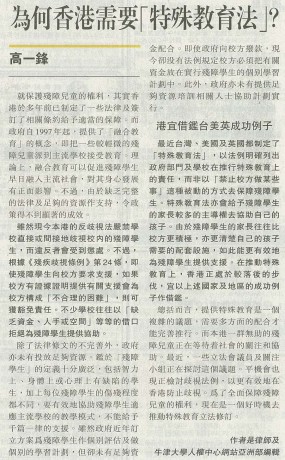Hong Kong has enacted laws and ratified treaties to protect disabled persons and children. But, there are very few laws addressing specifically the provision of educational services for children with special needs. Non-binding instruments largely govern this topic. To its credit, the government has issued and continuously refined education policies since 1997. Students with severe or multiple disabilities are placed in special schools, while others are “integrated” in mainstream schools. Nonetheless, it is hard for individuals to argue against policies, to say the least. The Equal Opportunities Commission (the “EOC”), the Education Bureau and other government agencies provide plenty of informative materials on related subjects. But, it is difficult to tell where to start amidst an information overload. By and large, parents and students are disempowered in the process.
Can anti-discrimination laws help? Schools are clearly prohibited from discriminating against a student with a disability. In practice, anti-discrimination laws are effective in a narrow range of scenarios. Let’s say your school provides certain services to its students. Your school refused to provide these services, as the services are deemed unsuitable to your child. Alternatively, these services are provided to everyone, including your child, but your child is disadvantaged as the services are really unsuitable for your child. According to the Disability Discrimination Ordinance, a disability discrimination claim cannot be established, unless the reason for such refusal or disadvantage is related to your child’s disability. The school could show other reasons for its decision. There are other specific legal considerations. For example, the school can also defeat a claim if it can show that it has taken reasonable steps to meet your child’s needs. What is reasonable is a balance between the school’s interests and resources and the student’s needs.
The EOC and the Institute of Education have found that the government’s commitment to special education needs (“SEN”) is inadequate, although the situation is improving slowly. The provision of educational services for children with special needs is ultimately a matter of government funding. The capacities of schools and teachers are over-stretched. From assessment to the creation and implementation of individual education plans, the processes to make special education work are resource intensive. Inefficiencies in the use of limited public resources are also problematic. Educational policy problems largely relate to the poor recognition of the diversity of SEN. Yet, one size cannot fit all -different types and severity of SEN requires different solutions.
For decades, Taiwan, the US and the UK have implemented SEN laws, and sought to empower students and parents, and to strengthen education policies. Mainland China is also considering the development of SEN laws. SEN laws can improve the accountability of SEN policies by imposing certain legal obligations on schools and government agencies. For example, with statutory force, individual education plans can become effective safeguards of students’ entitlements in special education. The laws plug holes in education, anti-discrimination and social welfare regulations that are inadvertently letting down children and young people with special needs. Special education services provision is a complex and often emotional issue. This may be a daunting reality but if your children were suffering now, would you simply surrender? Who would act for your children if not you? Local legislators, NGOs and special interests groups have been pushing for legislative reforms recently. This issue deserves our collective support.
UPDATE: To raise awareness of this issue, I published an opinion piece on the need for SEN laws in Chinese in the Mingpao Newspaper in August 2014.


2 comments on “Why Hong Kong has special needs for SEN laws?”